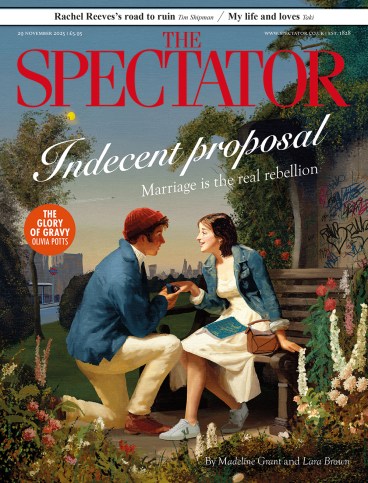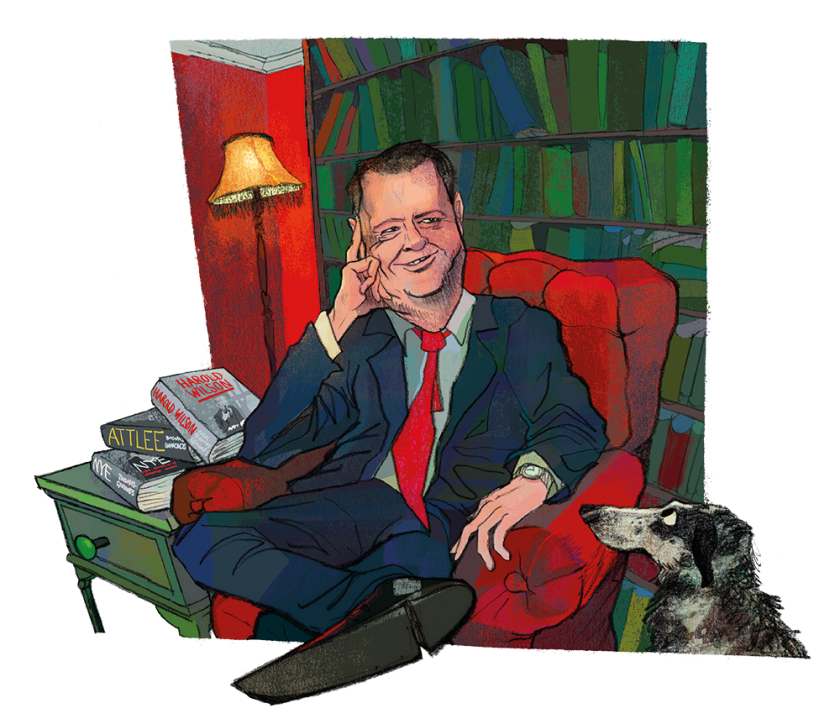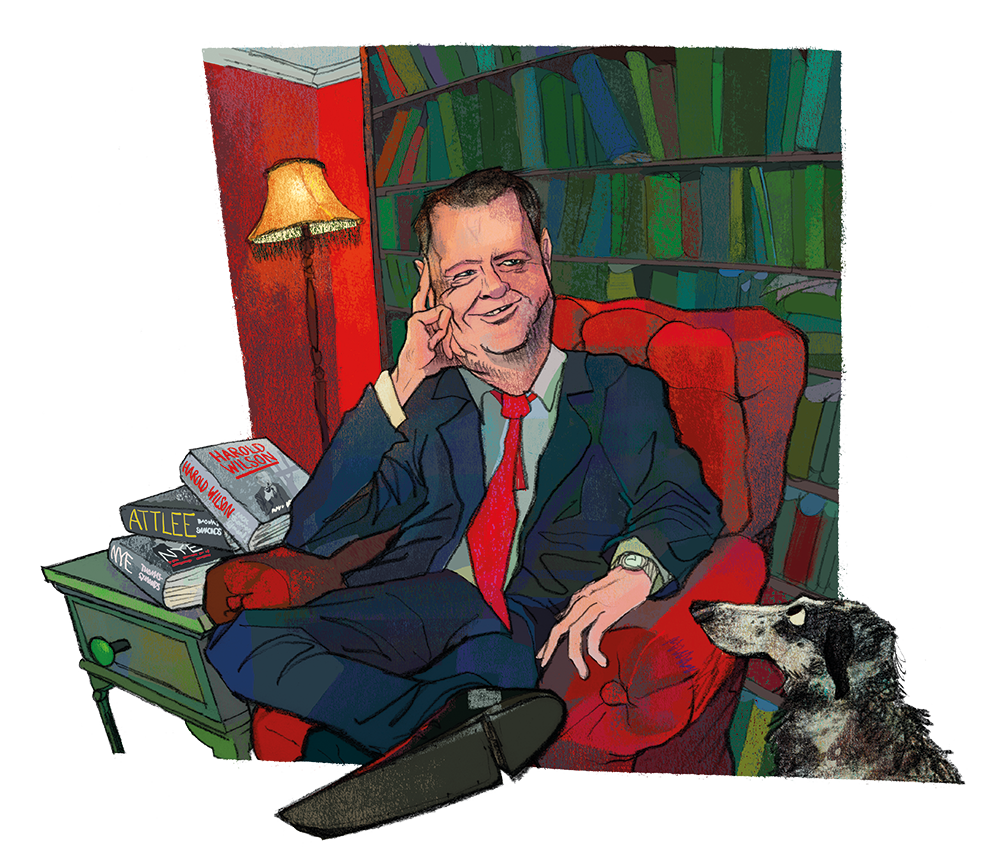
With his owlish expression and affable manner, Nick Thomas-Symonds looks more like the academic that he was, rather than the political bomb disposal expert he has become. Brexit is the greatest political issue for a generation, yet Keir Starmer has chosen to put this softly spoken Welshman in charge of defusing it.
The Cabinet Office minister, responsible for post-Brexit negotiations with the EU, is following in the footsteps of Olly Robbins and David Frost, but his lack of public notoriety says much about how things have changed as we approach the tenth anniversary next year of the vote to Leave.
‘We have probably the one trade deal in human history that raised barriers’
The biographer of Clement Attlee and Harold Wilson may be the last of the original Starmtroopers in the upper reaches of the government. An awkward fit as shadow home secretary, he found his métier as a backroom operator who appears to have disconnected the electricity from the third rail of British politics, pursuing his goals more effectively than most of his cabinet colleagues – with little of the public outrage which might have been expected.
In May he signed a memorandum of understanding with Brussels to negotiate a new deal on food and animal products (known as SPS) and energy emissions trading. Those twin talks began at official level, led by veteran civil servant Michael Ellam, on Wednesday and Thursday last week. Thomas-Symonds has just visited Cyprus and Ireland, the countries which hold the rotating presidency of the EU next year. He wants primary legislation ‘through parliament with Royal Assent by the end of 2026’ and ‘implementation of the SPS deal in the first half of 2027’.
We meet after he’s been grilled by the UK-EU Parliamentary Partnership Assembly, where MPs and peers interact with their EU counterparts, including Lord Frost. ‘It was good fun,’ he says. ‘We were sparring over the SPS agreement’ – something Frost opposes as undesirable alignment with EU rules.
Thomas-Symonds’s argument to Frost, who he says is ‘always respectful’, and to the public is that his work is one of the things the government is doing (a cynic might say one of the few things) to cut costs for business and boost growth. The government claims that an SPS deal could add £5.1 billion a year to the economy, saving businesses £1 million a month in burdensome checks. Export health certificates to transport food currently cost £200 per shipment.
‘Nobody is suggesting we are going back to the 2016 debates,’ he says. ‘We’re not revisiting the single market, the customs union or freedom of movement. But we are facing up to the truth of where we are. We have probably the one trade deal in human history that raised barriers, so we’re trying to bring them down. Just as we chose as a sovereign nation to sign an FTA with India, just as we chose an economic deal with the United States, we are choosing to align with another high standards jurisdiction.’
This will stick in the craw of some Brexiteers, but Thomas-Symonds says the choice will be clear in 2029: ‘My challenge to Lord Frost was simply this – it is a perfectly reasonable position to oppose a deal, of course, but I will want to have the debate at the next election. If the £200 per consignment is gone, the £1,400 cost if you are selected for sampling, and other fees are gone – are you seriously saying you were going to go into an election and put these back? Similarly, if there is downward pressure on food prices – that’s what the supermarkets expect – are you seriously going to put them up? We’re sharing criminal records of third-country nationals. Are you seriously saying we don’t want those tools any more?’
Thomas-Symonds is convinced by polling which shows ‘broad support’ from the public for the approach Labour is taking. He thinks the fight has gone out of some Eurosceptics. ‘I’m always interested in what your political opponents do in these situations,’ he says. ‘I can’t help but notice that Nigel Farage seems to have gone into a vow of silence on it. As far as I can make out he’s done something like two tweets in six months. He barely said anything in the days after we secured the agreement.’ There is a parallel here, he claims, with 2016: ‘The architects of Brexit essentially ran away after the Brexit referendum.’
These are punchy words from a politician who is less pugnacious than Frost, who used the media to fight some of his battles with Brussels. Thomas-Symonds outlined his approach in a speech at The Spectator in August. ‘I will intervene in public when I think I need to,’ he says. ‘But I generally operate in the negotiating room. I don’t negotiate through the papers or indeed through a megaphone.’ In this he is a halfway house between the hyper-secretive Robbins and Frost. ‘That’s one way of describing me.’
His first big challenge arrives this Sunday, the deadline to decide whether the UK can participate in the EU’s Security Action for Europe (Safe) scheme, a €150 billion loan facility for EU states to invest in defence for Ukraine. Predictably, the French are demanding a fee which Britain is so far unwilling to pay. Disagreements also remain over how ‘European content’ of military hardware is determined. Thomas-Symonds expects to be in the Cabinet Office late into the night talking to his opposite number, Maros Sefcovic. Is there a strategic case for participation? ‘Yes,’ he says. ‘But I will not sign up for something that is not value for money. Safe or no Safe, we will still be doing significant things on defence with our European allies.’ He points to a recent Norwegian order for frigates to be built on the Clyde and a Turkish order for Typhoon jets.
Paying to play in Brussels remains controversial, but Thomas-Symonds says Britain will contribute to the ‘administration costs’ of schemes the UK joins. ‘We wouldn’t make general contributions to the EU budget, but I supported the Sunak government’s re-accession to the Horizon programme and we’d obviously make a contribution to Horizon.’ He and Sefcovic recently visited a London university Horizon project to tame wild fires. ‘An SPS scheme will need to be administered, it needs all the data exchange.’
Similarly, when he was discussing rejoining the Erasmus student exchange scheme with Constantinos Kombos, the Cypriot foreign minister: ‘He suddenly tells me he was an Erasmus beneficiary and happened to be studying in Hull during the 2001 general election. One of his great memories is the famous [John] Prescott punch. We were marvelling about how public opinion on this was not quite what you necessarily expected it would have been in the days afterwards.’
The same seems true of Thomas-Symonds’s EU outreach efforts. If the pugilism of Brexit has left the domestic debate, he says tensions with EU leaders have also eased. Thomas-Symonds and Sefcovic regularly do business over Welsh Penderyn whisky. On a recent visit to Prague he found it impossible to get a daytime meeting in the diary with the Czech EU relations minister Martin Dvorak. ‘It turned out that he does all his diplomacy over Staropramen in the evening.’ Nice work if you can get it.
‘I can’t help but notice that Nigel Farage seems to have gone into a vow of silence on it’
The Europeans are even beginning to see things Britain’s way on migration. This Thomas-Symonds experienced firsthand when he accompanied Starmer to the European Political Community summit in Copenhagen last month. The Prime Minister was due to chair a meeting on migration when, five minutes before it started, he turned to Thomas-Symonds and said: ‘I’ve got to go back to chair Cobra. Here’s your file, Nick.’ It was the day of the anti-Semitic attack outside a Manchester synagogue.
Thomas-Symonds chaired the meeting of leaders, including Italy’s Giorgia Meloni and Mette Frederiksen of Denmark, whose migration policies have now been adopted by Shabana Mahmood, the Home Secretary. He secured tough language in the summit communiqué. ‘The desire for secure borders and tackling illegal migration is not something that’s exclusive to us. This is a shared problem.’ He then experienced strong borders. As a member of Starmer’s delegation, Thomas-Symonds did not get his passport stamped on entry to Belgium, but leaving he had to prove he was there legally in order to get an exit stamp. The British ambassador had to accompany him to the airport on the way home ‘to make the case that I had arrived legally in the country’.
Whatever your view of the direction Labour is going on Brexit, Thomas-Symonds (like Ed Miliband at Energy) is proof that successful ministers know what they are going to do long before they get their hands on power. Starmer approached him in the summer of 2023 and said: ‘I want you to go and prepare the ground. Come back with something that’s achievable, and if we win, I want you to come into government and deliver it.’ Thomas-Symonds read accounts of the previous negotiations and devised strategy, tactics and public messaging. ‘I spent more than a year in opposition, then ten months delivering the common understanding in government. We had a plan.’ This makes him a rare exception in this government.
Loyal to the last, Thomas-Symonds is ‘100 per cent confident Keir will lead the Labour party into the next election’. Whether he is right, it is unlikely any other Labour leader would unpick the work he is doing.









Comments